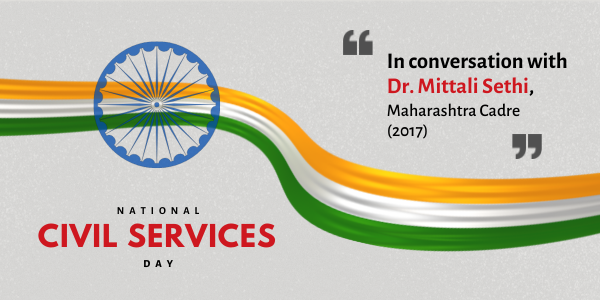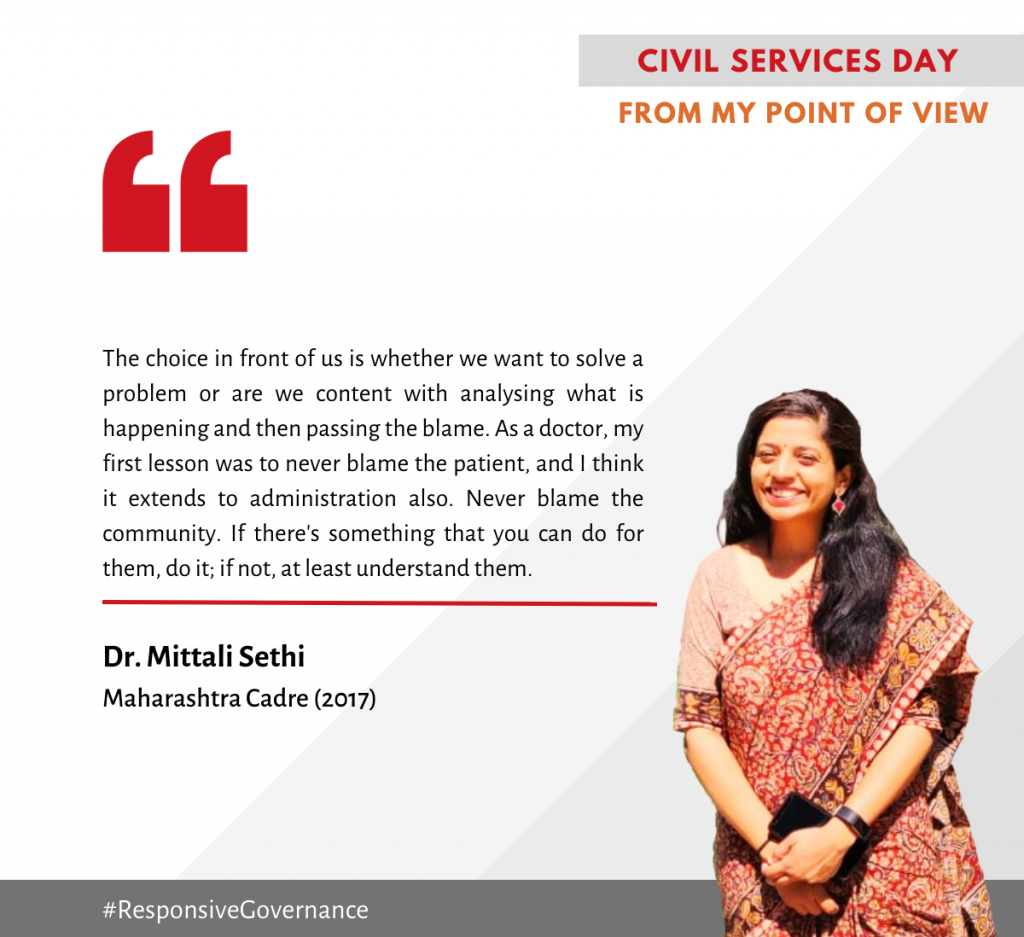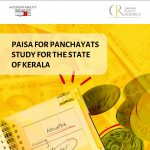
We Need to Listen to the Communities We Work With: Interview with IAS Dr. Mittali Sethi
25 April 2022
The bureaucracy is considered to be the steel framework that makes the country’s development aspirations a reality, but little is understood in the public about the people behind the scenes. State Speak is an exclusive interview series by the Accountability Initiative featuring insights from IAS officers posted in India’s districts and other public officials who have a vantage point on how the country is being governed, related challenges and best practices.
Dr. Mittali Sethi is an early-career IAS officer from the 2017 batch of the Maharashtra cadre. She is currently posted as Chief Executive Officer, Zilla Parishad, Chandrapur and has served as Project Officer, Integrated Tribal Development Project (ITDP), at Melghat in the past. Her interview below forms part of a series on the contributions and challenges of IAS officers, released in the follow up of Civil Services Day.
Q. Can you take us through a day in your life as CEO, Zilla Parishad. What are the kind of activities that you are engaged in, problems you are solving, and plans you are making?
Dr. Mittali: In a district, generally, the Chief Executive Officer, or what is called the Deputy Development Officer in some cadres, is responsible for the development of the district. There is also a revenue branch in every district which is headed by the Collector, in which the Tehsildar and Sub-Divisional Officer (SDO) are part of the hierarchy. I have the Block Development Officers (BDOs) with me.
So every district has blocks and my work is to focus on their development. Now, development here means to take care of the rural population’s education, health, water, electricity, etc. Fund management, therefore, is a big part of my job. I have multiple funds flowing in — the district fund that comes through the state; a mining fund in Chandrapur; a human development program that is separately routed. Also, the Zilla Parishad generates its own cess, which is completely different, and where we have flexibility for planning and are not bound by the state regulation.
So I feel like I’m in a dual role when I work as Chief Executive Officer — I am implementing state policies but I also get to plan policies from my own ZP and say that this is something that I want to plan and execute. For the same, I only need the approval of my Adhyaksha, who is a political head.
Q. In an article you wrote in the past, you had stated that civil services officers should not just be transmitters of data but users of data. So when you’re talking about local implementation, how does generating your own data and using it for specific plans geared towards your districts and blocks factor into your work profile?
Dr. Mittali: Let’s take my district as an example; Chandrapur has 15 blocks, but three of our blocks are tribal, out of which one block is 100 per cent tribal. When one looks at state metrics and compares the data indicators for the state, it’s going to be blanket data where you can look at the macro numbers and say that this is the zoomed out figure of the district. But when I ask the question, which is the worst performing Gram Panchayat or Block that I’m dealing with, I feel I need to devote 80 per cent of my energy to that GP or Block. So understanding how to do that triage and understanding what needs more attention is extremely important.
And this is true for officers at all levels; so let’s say for a Block Development Officer, the question becomes, which of my clusters or which of my Gram Panchayats are performing badly? For a supervisor the question becomes, which of my Anganwadis are subpar? And, of course, doing this is extremely difficult, because I feel like as a country, we’re still not generating enough local data and that we’ve still not understood the importance of context driven data and local data. When local officers are reporting data, our work is not to just wait for interventions at the centre or state level but to take responsibility for the data in our jurisdiction.
Q. In the same article you also mentioned that communities, government and nonprofits need to work together for better policy implementation and governance. How can communities and nonprofits play an important part in implementation?
Dr. Mittali: Addressing the importance of community is the easy part of the question because communities of course need to be involved for any intervention to be successful. So it’s very easy to convince people that any initiative is a collaboration between the government and community. Understanding the role of NGOs here is slightly more tricky, because there is a lot of in-built mistrust within the government towards NGOs and in NGOs towards the government. We have to break the ice somewhere and expand our collaboration beyond major NGOs. For example, Melghat has five large-scale NGOs but it also has a lot of people organisations, i.e. organisations that were built out of the local community.
In Melghat, we once organised a discussion forum where we invited all the local NGOs to hear what they are doing. And there we came across an organisation named Melghat Mitra which had 20 years of data on child deaths. And the beautiful thing with these organisations is that they are ready to give you their entire datasets if it can help in bringing about an intervention, and it did help us immensely. These were the people who helped us when we started launching our vaccination campaigns because of this reciprocal relationship of love and respect.
When the pandemic struck, I could not offer them anything but they were there because I think they understood the people much better than I ever could or an outside organisation ever could.
So, it’s not only important to think of a consortium of NGOs and how people can bring multiple energies to the table, but even within NGOs, understanding these community organisations and deliberating how can you empower them in areas they lack.
Q. As you mentioned, you have worked extensively in tribal areas. There’s a popular conception that there’s hesitancy and suspicion within the communities when it comes to integration with government plans. What has been your personal experience in this regard?
Dr. Mittali: No, I think it’s just a stereotype. It’s just something that we have chosen to believe and I have had really blunt discussions about this with people. And the one question that I ask is why would people choose to not listen to the government? It is just counterintuitive for people to constantly say that we are not going to even talk or that we’ll be resistant to everything that is happening, even when they’re saving our children, giving us nutrition, etc. And even if this is happening, the answer is to not abandon them. The answer is always going to be let’s understand what’s going on and then understand how and where we can intervene.
If we can just focus on improving our service delivery, then the beneficiaries would also tell others in their community about these services, that’s how any community changes. So I feel the choice in front of us is whether we want to solve a problem or are we just happy analysing what is happening and then passing the blame, which I don’t think ever works. As a doctor, our first lesson is to never blame the patient, and I think it extends to administration also. Never blame the community! If there’s something that you can do for them, do it; if not, at least understand them.
Q. On a different note, what motivated you to join the IAS? What still drives you?
Dr. Mittali: So what made me join the IAS is a long story, though it was partly because I joined an NGO in Gadchiroli. More than what I’m able to do for people, I think what I gain from is listening to their stories and being a part of people’s lives. This is what drives me everyday. Of course it is interesting to understand different policies, problems, bottlenecks and solving them, but my eureka moment has always been when things are unfolding.
Q. According to you, has the role of the IAS cadre reshaped over the years of you being an active public servant? Are there additional responsibilities and expectations or have the policy priorities shifted?
Dr Mittali: It’s not about an increase or decrease in responsibilities but rather the changing nature of responsibilities. So, for example, with technology intervention in data analysis, we can do the data localisation which I mentioned, and this was something that was not possible in the past. So, earlier, when one was on the field, a person would share their problem and only theirs could be solved amidst the problems of 100 villages at the time. Today, it’s possible to build a grievance redressal system where problems from say 100 villages can be solved. Initially these problems were not reaching me, but today, they are reaching.
And now with social media, the changing nature of politics, and the intersection of judiciary and politics, administration is becoming very complex. Though not in a bad way; both the policy and the country are evolving, so it has to become complex. But I think it has always been like this that officers are always at this intersection where they have had to make sense of what is happening, and then understand how to make implementation or policy effective in the present circumstances. I think that aspect has remained constant.
Q. What do you think are the top skills which IAS officers will need in the future? And the governance challenges which they must be cognizant of in the coming future?
Dr. Mittali: One specific skill that I want people to learn is developing an understanding of data. We have so much big data being generated, which we need to be able to make sense of and understand how to centralise and how to decentralise.
By data, I don’t mean things like coding or computer languages, but a basic understanding of where the data are being generated and how many streams of data are being generating for one factor. For example, in health, for one variable there are multiple data entries which don’t match, and the understanding of this is not something that one will learn with Java or C++; the understanding of that comes when one sits with an Auxiliary Nurse Midwife, for example, and listens to her.
The second important thing is to have the understanding that collaboration is extremely important. We are far away from a world where we could say that IAS officers are the most important people in the system and they don’t have anybody else to work with. I feel like acamedics, NGO staff, communities, and multiple other consultants who are in the field, add so much richness to what we’re doing. And to understand that we come in as generalists, that we are not specialists in everything and we cannot be specialists in everything. So to understand who brings what to the table is extremely important.
Lastly, I feel that behavioural communication is crucial. The one thing which we still need to understand is how can we listen to communities we work with, understand them, and nudge them? How do we break complex policy into simple things that people can understand is definitely something that an officer should work upon.

This interview has been edited for length.
The opinions expressed are personal and do not represent an institutional stand.
Also Read: Civil Servants Have to Become Facilitators: Interview with IAS Simi Karan





